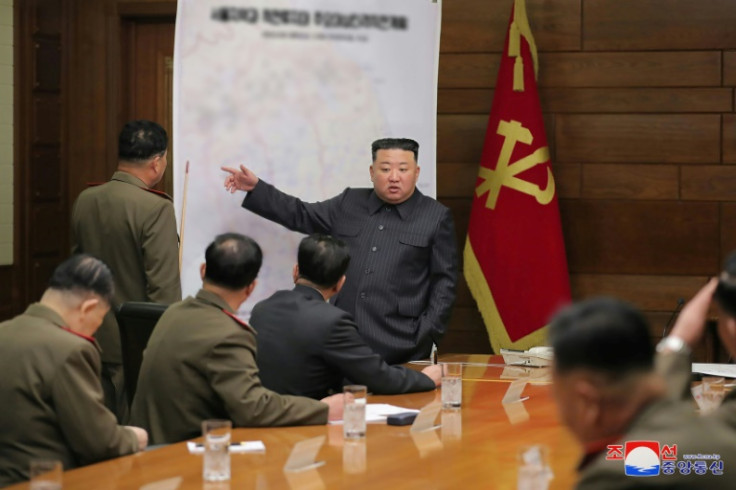'Very Dangerous Situation': North Korea Strongly Opposes US Plan To Deploy Nuclear Missile Submarine

KEY POINTS
- The move is seen as a potential trigger for a devastating nuclear conflict
- This would mark the introduction of U.S. strategic nuclear weapons to the Korean peninsula for the first time since 1981
- A U.S. nuclear-powered cruise missile submarine arrived at the port of Busan in June
North Korea has expressed its strong opposition to the United States' intention of positioning a nuclear missile submarine near the Korean peninsula, stating that such a decision has the potential to escalate into a catastrophic nuclear confrontation.
The North Korean defense ministry, through a statement reported by the Korean Central News Agency (KCNA) on Monday, conveyed its concerns about the U.S. plan, which was agreed upon by the leaders of the U.S. and South Korea during an April summit. The statement highlighted that this move would mark the reintroduction of U.S. strategic nuclear weapons to the Korean peninsula for the first time since 1981.
"This is a very dangerous situation as it will bring the regional military tension to a more critical state and may incite the worst crisis of nuclear conflict in practice," the unnamed spokesperson said.
The plan devised by the United States is viewed as an explicit act of nuclear blackmail against North Korea, as well as neighboring countries in the region, the KCNA report said. The statement emphasizes this plan poses a serious threat to the maintenance of peace.
The ministry asserted that the occurrence of an undesirable and critical situation in the Korean peninsula region, which is undesired by all parties involved, will depend on the future actions of the United States. Furthermore, it holds Washington accountable for any unforeseen circumstances that may arise.
During a meeting in Washington in April, President Joe Biden and South Korean President Yoon Suk-yeol reached an agreement regarding the visit of a U.S. Navy ballistic missile submarine equipped with nuclear weapons to South Korea. However, no specific timeline was provided for the anticipated visit, Al Jazeera reported.
The planned visit of the ballistic missile submarine to South Korea is intended to enhance the deployment of U.S. strategic assets as a proactive response to North Korea's nuclear and ballistic missile program. The objective was to strengthen the ability to effectively address the evolving security situation in the region.
A U.S. nuclear-powered cruise missile submarine arrived at the port of Busan in South Korea last month. A US B-52 strategic bomber also participated in air military exercises alongside South Korea. These demonstrations of military strength were conducted in response to North Korea's unsuccessful attempt to launch a spy satellite, showcasing the resolve and solidarity between the U.S. and South Korea.
Pyongyang has expressed grave concerns regarding the deployment of nuclear submarines, saying it has created a "very dangerous situation that makes it impossible for us not to realistically accept the worst-case scenario of a nuclear confrontation."
Furthermore, North Korea alleged that U.S. reconnaissance aircraft have recently breached its airspace in the vicinity of the east coast. In a cautionary message, it warned that "there is no guarantee that a shocking incident where a U.S. air force strategic reconnaissance plane is shot down over the East Sea will not happen."
In the statement, North Korea references previous incidents where it claims to have shot down or intercepted U.S. aircraft near the border with South Korea and in coastal areas.
The threats come as Yoon is preparing to participate in the annual NATO summit, which is taking place in Vilnius, Lithuania, on Tuesday and Wednesday. This is the second consecutive year that the South Korean leader has joined the summit, highlighting his commitment to strengthening connections with the largest military alliance globally.
© Copyright IBTimes 2024. All rights reserved.





















